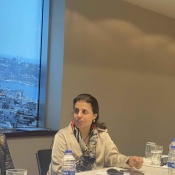In Institute of Law symposium, scholars and legal experts discuss healthcare access in Palestinian law
Academics and legal scholars discussed the right to health and access thereof for Palestinian patients in Gaza in a symposium organized by Birzeit University’s Institute of Law on Thursday, April 21, 2022.
Entitled “The Health Rights of Gaza Patients and Patient Transfers,” the symposium is part of a series of discussions and forums organized regularly by the institute to highlight legal issues and concerns relevant to the Palestinian community. Ala’ as-Skafi, director of the Al-Dameer Association for Human Rights, and Dr. Osama Bal’awi, a health consultant, led the discussion.
In the symposium, chaired by Lina al-Tounisi, coordinator of the Institute of Law’s office in Gaza, As-Skafi gave a brief overview on the concept of health in International Humanitarian Law and the right to health under Palestinian laws, noting that the Palestinian Basic Law does not address the right to health directly. Article 10 of the Basic Law, however, provides for compliance with fundamental human rights and freedoms, so the Palestinian Authority has to accede to international conventions and declarations which, will provide protection and access to human rights.
The second shortcoming with the Palestinian Basic Law, As-Skafi added, is that it does not address important aspects with regards to access to health, including the provision of health insurance and the healthcare access of senior citizens and people with disabilities.
The complexities and obstacles that impede Palestinian patients’ access to healthcare, As-Skafi noted, constitute a violation of the right to health; run counter to the principle of progressive realization of the right to health under the International Covenant on Economic, Social and Cultural Rights; and contradict the 2017–2022 Palestinian National Health Strategy.
Bal’awai, focusing on specialized treatment and patient transfer cases, discussed the procedures and mechanics put in place by the Palestinian Ministry of Health to address the shortfalls at governmental health facilities as well as the lack of medical experience, devices, and equipment. The ministry, he explained, bridges these gaps by purchasing medical services from local health providers, including private, civil society, or charitable health institutions, in addition to international public and private healthcare providers.
Patient transfers, said Bal’awai, is one of such mechanics used to address the gap in healthcare provision. Simple cases, he explained, are transferred to local hospitals in the Gaza Strip as well as to national hospitals, such as An-Najah hospital in Nablus and Al-Makassed and Augusta Victoria hospitals in Jerusalem. This transfer process, he added, requires that patients cross the Beit Hanun (Erez) crossing point. Patients whose treatment is not available in the Gaza Strip, however, are transferred to hospitals inside the Green Line. Bal’awai explained that the cost of treatment at other healthcare facilities is usually covered in total, while patients contribute 5 percent to the cost of other services. However, patients and their families cover indirect costs, including transportation and accommodation.
Al-Tounisi wrapped up the discussion and gave the floor to attendees for questions and comments. Many interventions and recommendations were advanced, including the possibility of providing an integrated set of health services, including medical specialties for which patient transfers are needed most, such as cancer, heart surgery, and cardiac catheterization








